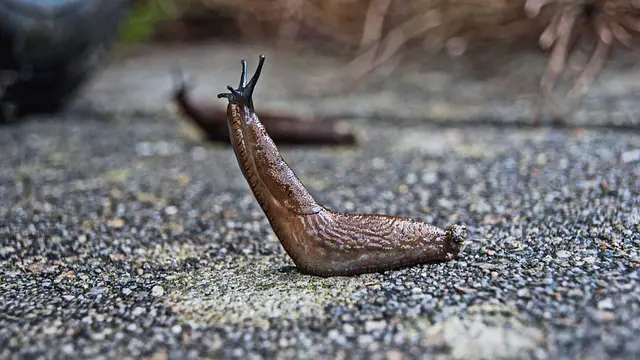Bearded dragons are popular pets for reptile enthusiasts due to their docile nature and unique appearance. However, as with any pet, ensuring they are fed a healthy and balanced diet is crucial to maintaining their overall health and well-being.
One question for bearded dragon owners may arise is whether they can safely consume slugs.
While bearded dragons are known to consume a variety of insects and vegetables, it is essential to exercise caution when introducing new foods into their diet.
Slugs, in particular, may pose a potential risk to bearded dragons due to their slimy texture and potential to carry harmful parasites or bacteria.
Researching and consulting with a veterinarian or experienced reptile owner is essential before incorporating new foods into a bearded dragon’s diet. By taking the necessary precautions and ensuring a balanced diet, bearded dragons can live long and healthy lives as beloved pets.
Can Bearded Dragons Eat Slugs?
Bearded dragons are omnivores and can eat a variety of foods. However, not all foods are safe for them to consume. One food that may come to mind is slugs. This section will discuss whether or not bearded dragons can eat slugs and the risks associated with feeding them this food.
The Risks of Feeding Bearded Dragons Slugs
While slugs may seem like a harmless food item, they can pose a risk to bearded dragons. Slugs can carry parasites and bacteria that can make your bearded dragon sick.
Additionally, slugs contain high moisture levels, which can lead to diarrhea and other digestive issues in bearded dragons.
If your bearded dragon ingests a slug exposed to pesticides or other harmful chemicals, it can also lead to serious health problems.
Therefore, it is best to avoid feeding your bearded dragon slugs altogether.
Alternatives to Slugs for Bearded Dragons
If you are looking for alternative food options for your bearded dragon, there are plenty of safe and nutritious options. Some examples include:
- Leafy greens (kale, collard greens, mustard greens, etc.)
- Squash (butternut, acorn, spaghetti, etc.)
- Green beans
- Carrots
- Blueberries
- Apples (without the seeds)
It is important to note that bearded dragons have specific dietary requirements, and providing them with a balanced diet is essential. Please consult a veterinarian or reptile expert to ensure your bearded dragon gets the proper nutrition.
What Do Bearded Dragons Eat?
Bearded dragons are omnivores, meaning they eat both animal and plant-based foods. In the wild, they eat various insects, invertebrates, and vegetation. However, in captivity, a balanced diet is essential to ensure they receive all the necessary nutrients for their health and well-being.
A Balanced Diet for Bearded Dragons
A balanced diet for a bearded dragon should consist of 50-60% vegetables, 30-40% insects, and 10% fruit. It’s important to vary their diet to provide a range of nutrients and prevent boredom.
Some good vegetable options include:
- Kale
- Collard greens
- Mustard greens
- Endive
- Butternut squash
Good insect options include:
- Crickets
- Dubia roaches
- Mealworms (in moderation)
- Superworms (in moderation)
The Nutritional Value of Different Foods for Bearded Dragons
Understanding the nutritional value of different foods is essential to ensure your bearded dragon receives a balanced diet. Here are some important nutrients and the foods that provide them:
| Nutrient | Foods |
|---|---|
| Calcium | Kale, collard greens, mustard greens, dandelion greens, butternut squash, calcium supplements |
| Protein | Crickets, dubia roaches, mealworms, super worms, pinky mice, boiled chicken |
| Vitamin A | Carrots, sweet potatoes, butternut squash, kale, collard greens |
| Vitamin D3 | UVB lighting, calcium supplements |
| Fiber | Leafy greens, squash, carrots, green beans |
How to Feed Bearded Dragons
Bearded dragons are omnivorous, which means they eat both plants and animals. They require a balanced diet to stay healthy and active. Here are some tips on how to feed your bearded dragon:
Feeding Schedule for Bearded Dragons
Bearded dragons should be fed daily, but the amount and type of food they eat depends on their age and size. Here is a general feeding schedule for bearded dragons:
| Age | Frequency | Food Type |
|---|---|---|
| 0-3 months | 2-3 times a day | Small insects, such as crickets and mealworms |
| 3-6 months | 2 times a day | Medium insects, such as dubia roaches and super worms, and some vegetables |
| 6-12 months | 1-2 times a day | Large insects, such as hornworms and silkworms, and more vegetables |
| 12+ months | 1 time a day | More vegetables and fewer insects |
Feeding Techniques for Bearded Dragons
When feeding your bearded dragon, it is vital to use the proper techniques to ensure they are getting the right amount of food and nutrients. Here are some feeding techniques for bearded dragons:
- Use a shallow dish to feed vegetables and fruits
- Gut-load insects before feeding them to your bearded dragon
- Dust insects with calcium and vitamin D3 supplements before feeding them to your bearded dragon
- Remove any uneaten food after 15-20 minutes to prevent spoilage and bacteria growth
- Provide fresh water daily in a shallow dish.
Conclusion
Based on the information presented, it is clear that bearded dragons can eat slugs. However, it is essential to note that slugs should not be a staple in their diet. While slugs are rich in protein and other nutrients, they can also carry parasites and diseases that can harm bearded dragons.
If you decide to feed your bearded dragon slugs, it is vital to ensure they are sourced from a reputable supplier and thoroughly cleaned before feeding. Feeding slugs in moderation and as part of a varied diet that includes other insects and vegetables is also recommended.
While slugs can be a safe and nutritious addition to a bearded dragon’s diet, it is essential to exercise caution and good judgment when incorporating them into their feeding regimen.




